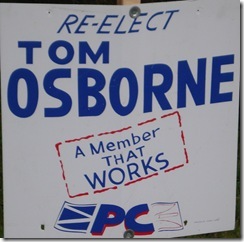You can tell we are in the final week of a federal election campaign.
The attack ads are out.
Everybody has one.
Some people are whining about them.
Some candidates are trying to distance themselves from them, as in NDP candidate Ryan Cleary:
The NDP is distributing a flyer questioning Ignatieff's trust and attendance in Parliament.
The party's candidate in St. John's South–Mount Pearl, Ryan Cleary, said the negative advertisements are coming from the national NDP campaign, not his.
"I've seen that and that's one of the strategies they want to take, so, yeah," he said.
There’s no small measure of hypocrisy in the NDP attacks, of course. Cleary’s supporters have been whining about since 2008 about some material Liberal incumbent Siobhan Coady circulated in the last election about Cleary.
There’s a reason why campaigns use so-called attack ads or negative ads: when they are done properly, they work and they often work better than anything else.
“Done properly” means factual comments that address a concern voters have about a candidate, a party or a leader.
A campaign team will figure out the voter concern through polling. Forget the horse-race stuff. That’s just bumpf for the people who need to feed their tweets. A well-organized campaign can turn around the run-away races or quickly eliminate a close race using solid research coupled with good communications and a willingness to use the tools correctly.
Make no mistake: it isn’t that simple or formulaic. Campaigns are as much about the battle between teams as anything else. Teams are made up of people. People make decisions and sometimes they make bad ones. But given the situation, most campaigns will use the tools they have, including negative or attack ads.
What makes the spate of local attacks ads curious is that they seem to be bizarre.
According to the Telegram, the NDP dropped a postcard in St. John’s East this weekend that, like its counterpart in St. John’s South-Mount Pearl attached Liberal leader Michael Ignatieff because of his poor attendance in parliament?
Okay people.
Jack Harris needs to run attacks ads to fend off the Liberals? According to the only poll publicly available, the Liberal contender in that riding is running at less than five percent of the vote. The thing can’t have an spill-over because it was delivered to households.
But then there’s the issue. People loved Danny Williams all to pieces and he had such naked contempt for the legislature he set new record lows for sitting in the legislature by a serving Premier. On the face of it, this is not what you would call a vote-determining issue. But hey, maybe they have some sooper sekrit research that shows people in Kilbride and Torbay are parliamentary channel nerds.
Then there are the Conservative ones. Loyola Sullivan is hammering away at the idea that without a Conservative government in Ottawa the loan guarantee for Muskrat Falls is a goner.
In February, 2011 CRA’s polling for the provincial government showed that three percent of respondents thought that the Lower Churchill should be the top priority of the provincial government in the next few years.
3%.
That’s not a typo.
That’s all.
Even if Loyola was running in Labrador, his Lower Churchill scare piece would appeal to only the 4% of respondents there who thought it was an issue. Again, not exactly what you would call a topic that is going to drive voters to the polls, let alone make them pick a particular candidate.
For their part the Liberals, their bizarreness is the absence of any local negative pieces this time out. That’s not to say there aren’t; maybe there are. It’s just that your humble e-scribbler hasn’t seen or heard anything.
Not like there isn’t plenty to hammer away at for either the Conservatives or the New Democrats and their candidates just like their could be for blue and orange to toss at red. It’s the kind of stuff you’d expect in a race like St. John’s South-Mount Pearl that is, supposedly, too close to call.
Maybe the clue is the way all the candidates and all the media are fixated on Muskrat Falls. Grits and Dippers are talking about it because the Connies made it an issue. The media are covering it because the pols keep telling them it is big. But there is no sign the voters give a tinker’s damn about the dam.
Bizarro.
No one should be surprised if – in the end - the Newfoundland negative ads in this federal election are likely to fall completely flat. The reason is simple: they obviously aren’t driven by what voters are interested in.
As a result, they may look aggressive but they are the equivalent of hitting your opponent with fluffy stuffed bunnies.
- srbp -

